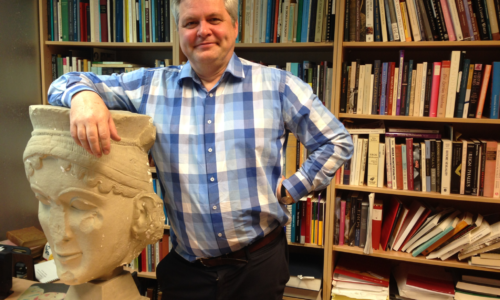Plan: only a researcher with a permanent position can apply for a Vidi
-
 Illustratie: Roel Venderbosch
Illustratie: Roel Venderbosch
The Netherlands Organisation for Scientific Research (NWO) wants scientists who receive a Vidi grant to be given a permanent position by the university at which they work. Radboud University is going a step further and is proposing that only researchers with a fixed appointment should be able to submit an application. Rector Magnificus Han van Krieken: ‘We do not want the NWO to determine our staff policies for us.’
Every researcher will agree: obtaining an NWO grant is becoming more and more difficult. The numbers do not lie either: in 2017, the acceptance rate of Veni applications was just 14 per cent. This is not because the proposals were bad, but simply because there is too little money. The NWO agrees that this leads to an unnecessary waste of time to prepare good applications that are not granted.
Last year, the funding provider created a plan in an attempt to raise the acceptance rate. In concrete terms, this means that, beginning with the upcoming submission round for the prestigious Talent Scheme, the NWO will require that institutions provide Veni and Vidi grant applicants with so-called ‘embedding guarantees’. The NWO has recently announced this.
Fixed contract
In practice, this will primarily impact the Vidi round. From now on, institutions must provide laureates with a fixed contract or at least, a tenure track appointment. This was not a previous requirement and as a result, there are currently Vidi laureates who are working under temporary contracts, without any concrete prospects of a permanent position, including at Radboud University.
Nevertheless, the stricter conditions are not being received poorly at the Nijmegen campus. ‘On the contrary’, responds Rector Magnificus Han van Krieken when asked about it, ‘they are actually in line with the plans that Radboud University already has. But as a university, we also don’t want the NWO to determine our staff policies for us. Therefore, from now on, we would prefer that anyone applying for a Vidi grant already has a permanent position.’
‘A 35-year-old researcher should also be able to sign a mortgage on a house’
‘Fixed contracts should be given more often’, says Van Krieken. ‘That is simply a quality of a good employer. As the Executive Board, we don’t want, say, 35-year-old researchers who regularly carry out work here without a fixed contract. I think that is very undesirable. They should be able to sign a mortgage for a house, too. Other universities aren’t doing this yet: Radboud University is ahead of the pack in this regard.’
Having confidence
‘The faculties are the ones who have to let go of the fear of fixed contracts,’ notes Van Krieken. ‘That will be quite an adjustment for some of them. But it is absolutely possible. Research directors must ensure that talent is used more effectively as a selection criterion. You then have to show those talented people that you have confidence in them by providing them with a fixed contract sooner.’ In addition to that, he indicates that you have to stimulate mobility, so that there is movement within the organisation as well as to positions outside the organisation. ‘There is nothing sadder than a burnt-out, 55-year-old associate professor.’
The changing staff policy will limit the number of people who can submit a Vidi application, but the Rector does not see that as a problem. ‘I would rather see research institutes focus a bit more on larger grants for research teams. We are very successful when it comes to obtaining individual grants, but not as great when it comes to team grants, such as those from the European Union.’ Even though that is actually a very interesting route to take in order to fund research groups for an extended period of time, he clarifies.
‘There is nothing sadder than a burnt-out, 55-year-old associate professor’
Van Krieken expects the policy change he is describing to be a process that will take several years. ‘The NWO’s new policy aligns nicely with what we want.’ The Executive Board is currently in talks with the faculty to further develop the ‘sustainable’ staff policy. ‘We really want to see substantial changes and we will also be monitoring the progress in this regard, such as in the annual appraisal interviews with the faculties.’
The Executive Board hopes to have arrived at the exact conditions regarding the Veni and Vidi requests by the summer — well before the first Vidi submission deadline in October.
Update
In response to the comments below the Dutch version of this article, University Spokesman Martijn Gerritsen would like to make a clarification:
‘The idea is not that you need to have a permanent position in order to be able to apply for a Vidi. The Executive Board would like researchers who have received embedding guarantees from the university — meaning they possess qualities the university feels are valuable — who apply for a Vidi from the NWO to become eligible for a tenure track towards a permanent position, regardless of the NWO’s assessment. That is the proposal that will be discussed.’

